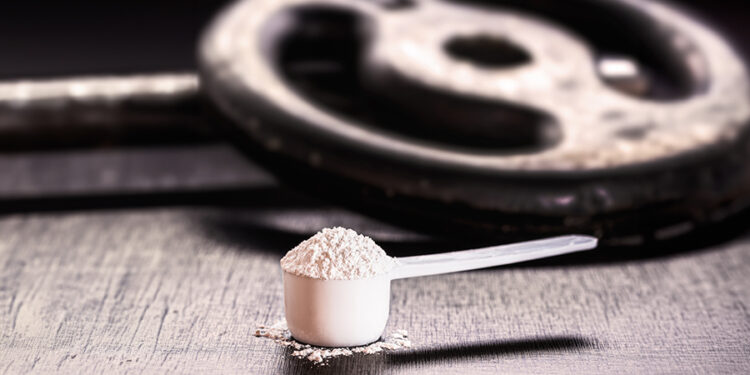Creatine is a compound derived from three amino acids and is predominantly found in your muscles and brain. While most people obtain creatine through seafood and red meat, the amounts are much lower than what is found in synthetic creatine supplements. Additionally, the liver, pancreas, and kidneys produce about 1 gram of creatine daily.
The body stores creatine primarily as phosphocreatine in the muscles, where it serves as a source of energy. As a result, many people take creatine supplements to enhance athletic performance and promote muscle growth.
Oral creatine is also used to manage certain brain disorders, neuromuscular conditions, congestive heart failure, and other health issues. Topical creatine may be applied for treating aging skin.
Creatine has been a popular sports supplement since the early 1990s, widely recognized for its ability to enhance strength and speed in athletes.
Its benefits extend beyond just performance, as creatine supplementation also leads to significant increases in muscle mass, making it a favorite among bodybuilders. According to Kreider, “Trained athletes can see as much as a 3.5-kilogram increase in muscle mass over 5 to 10 weeks.” This is a remarkable difference compared to those who follow a regular training regimen and diet, where muscle gain may be limited to just half a kilogram per month.
Creatine may also offer notable advantages as people age. “We recommend creatine for active aging to help slow the decline in muscle mass and maintain muscle performance,” Kreider adds.
However, experts caution that creatine is not a miracle solution and should be used in conjunction with a healthy lifestyle. “The true benefits, especially for muscle growth, are most noticeable when combined with exercise or resistance training,” notes Forbes.
A comprehensive scientific review published in Frontiers in Nutrition examined several studies on creatine and its impact on brain function. After analyzing data from various experiments, researchers discovered that taking 5g of creatine daily for six weeks resulted in a 31% improvement in memory and a 51% increase in processing speed, highlighting its significant effects on cognitive performance.

Benefits of creatine
- Enhances Physical Performance: Creatine is one of the most extensively studied dietary supplements, particularly in the realm of sports nutrition. It is well-established for improving physical performance, muscle growth, and repair. With over 1,000 published clinical trials, research has shown that creatine can boost the performance of high-intensity and repetitive strength exercises by 10-20%. Leading organizations such as the International Society of Sports Nutrition (ISSN), American College of Sports Medicine (ACSM), and the American Dietetic Association (ADA) all recognize creatine as the most effective supplement for improving exercise performance and increasing muscle mass. Its effectiveness is rooted in its role in energy production—by replenishing ATP, creatine enables athletes to train harder and longer, thereby enhancing muscle strength, speed, and power. However, studies have not shown a benefit for endurance or aerobic training in trained individuals.
- Boosts Muscle Growth and Lean Body Mass: Creatine supplementation has been demonstrated to significantly increase lean body mass in human studies, primarily by enhancing training performance. It also promotes muscle protein synthesis and reduces muscle breakdown, contributing to muscle growth. A recent analysis of 28 clinical studies revealed that combining creatine with resistance training led to an average increase in lean body mass of 1.46 kg (3.2 lbs) in men, while women saw a smaller increase of 0.29 kg (0.6 lbs).
- Promotes Water Retention: Beyond its effects on energy and muscle growth, creatine also promotes water retention, which enhances hydration and improves performance, particularly in hot conditions. A study on collegiate football players found that those taking 5g of creatine daily for four months experienced fewer muscle cramps, strains, and incidents of dehydration or heat illness compared to those taking a placebo.
- Aids Recovery: Creatine helps reduce muscle damage and accelerates recovery after exercise. This benefit is linked to creatine’s role in energy production and its anti-inflammatory effects. Studies have shown that creatine supplementation reduces blood markers of inflammation and improves metabolic markers, aiding both anaerobic and aerobic recovery. Reduced muscle damage and quicker recovery are especially beneficial for elite athletes.
- Aging and Brain Health: Creatine may also support healthy aging by slowing declines in muscle mass, bone density, cognitive function, and memory. Research indicates that creatine supplementation can improve overall health in older adults, enhancing blood sugar control and cholesterol levels. Furthermore, studies have shown that 5g of creatine daily for six weeks can improve memory and cognitive performance in older adults.
- Mood and Brain Function: Creatine has shown promise in improving mood and well-being. Several clinical trials have demonstrated that creatine supplementation can elevate mood scores compared to a placebo. Additionally, creatine appears to enhance brain energy production, particularly in key areas associated with mood regulation, with higher brain energy linked to more positive mood outcomes.
Final Comments:
Creatine stands out as one of the most thoroughly researched and effective supplements available today, offering a wide range of benefits that extend far beyond the gym. From enhancing physical performance and muscle growth to supporting brain health, cognitive function, and healthy aging, its impact is both significant and scientifically supported. However, like any supplement, creatine works best when combined with a balanced diet, regular exercise, and healthy lifestyle habits. It’s not a magic fix—but for those who use it wisely and consistently, it can be a powerful ally in both athletic performance and overall well-being.
Source: webmd.com










